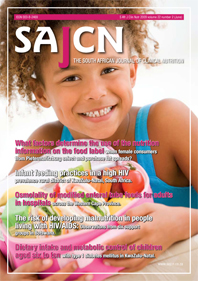Osmolality of Modified Enteral Tube Feeds For Adults in Hospitals Across the Western Cape Province
Abstract
Objectives. The first aim of this study was to determine the incidence of use-, reasons for use-, and procedures/recipes followed in modifying enteral tube feeds (ETF) for adults in state and private hospitals across the Western Cape province (WCP) (baseline data). The second aim was to determine the osmolality of the modified ETF used by these hospitals (osmolality data).Design. A descriptive cross-sectional study.Setting and Subjects. The study was conducted in January / February 2007. The baseline data was collected by means of a coded questionnaire sent to all state and private hospitals in the Western Cape Province (n=111), excluding all children’s hospitals. The osmolality data was obtained by means of freeze-point depression of the modified ETF recipes obtained from the participating hospitals.Results. A total response rate of 94% was obtained. Of the participating hospitals (n=104), 48% were state (n=50) and 52% were private hospitals (n=54). Sixty two percent of hospitals (n=64) made use of ETF, with 25% modifying their feeds (n=16). Twelve recipes were obtained for the osmolality testing. Eight recipes (66%) were significantly lower (p<0.001), two (16%) were significantly higher (p<0.001) and two of the recipes did not differ from the standard enteral product. Eight recipes (66%) had a significantly higher average osmolality (p<0.001) than that of body fluid. The concentrated ETF recipe (1.43 kcal/ml) had the highest osmolality (707 mOsm/kg/H2O). Conclusion. Modular ETF had a lower average osmolality than that of the semi-modular, the standard enteral product and body fluid (300mOsm/kg/H2O).
Published
2009-04-11
How to Cite
Schafer, L., Templin, K., Dlamini, P., Kruger, J., & van Wyk, E. (2009). Osmolality of Modified Enteral Tube Feeds For Adults in Hospitals Across the Western Cape Province. South African Journal of Clinical Nutrition, 22(2), 81. Retrieved from http://sajcn.redbricklibrary.com/index.php/SAJCN/article/view/210
Issue
Section
Original Research
Material submitted for publication in the South African Journal of Clinical Nutrition (SAJCN) is accepted provided it has not been published elsewhere. Copyright forms will be sent with acknowledgement of receipt and the SAJCN reserves copyright of the material published.
The SAJCN does not hold itself responsible for statements made by the authors.


